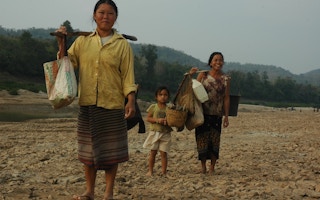Opponents of a controversial dam proposed for the Mekong River accused the Lao government Monday of disregarding regional government agreements by allowing work to commence on the project before the approval process was complete.
The Mekong River Commission (MRC) Joint Committee, a regional organisation charged with promoting sustainable development of the Mekong River, yesterday decided to postpone the decision of whether or not to approve the Xayaburi dam in Laos, the first of 11 dams proposed for the lower Mekong River.
Under a regional agreement established in 1995 by the governments of Lao PDR, Thailand, Cambodia and Vietnam, governments must submit applications and environmental impact assessments (EIAs) to the MRC for approval before undertaking projects that impact other Mekong Countries. Laos started the formal approval process in October last year.
But a Thai newspaper reported on Sunday that work on the project has been underway for five months.
The Bangkok Post interviewed villagers in the area of the dam and took photos of the construction work. The villagers said Lao authorities told them they would be given $15 compensation for relocation and would have to leave at an unspecified date.
Under the current development plan, more than 2,000 people will have to relocate before the dam is built.
“That project preparations have already commenced on the Xayaburi Dam demonstrates the company’s and the Lao government’s complete disregard for the findings of the MRC-commissioned Strategic Environmental Assessment report, the regional government decision-making process, which is not yet even complete, and the widespread public opposition to the dam,” said Ame Trandem, a campaigner for NGO International Rivers.
“If the Lao government does not act in good faith and respect the regional processes that it has committed to, the future of the Mekong River and its people is indeed bleak,” she added.
At yesterday’s MRC meeting in Vientiane, a collective decision was made to bring the approval of the project to the ministerial level after representatives from the four nations failed to reach agreement on the dam’s approval.
A statement issued by the MRC after the meeting stated that while Laos saw no need to extend the approval process, Thailand, Cambodia and Vietnam called for further public consultations and studies on the dam’s impacts.
Thailand’s delegate said that Thailand was concerned about the way of life of the people depending on the river, and that the public’s concerns about the broader impacts of the dam had still not been addressed. “We would like to see that public views and concerns are well taken into consideration,” said the director general of Thai Department of Water Resources Jatuporn Buruspat.
Cambodia’s delegate said there were gaps in the existing approval process and that project developers needed more time to address both technical requirements and inadequate public consultation in MRC countries.
Taking the strongest stance was Vietnam’s head delegate Dr Le Duc Trung. He recommended a ten year postponement of all hydropower development projects on the Mekong’s main branch. “The deferment should be positively seen as a way to provide much-needed time for riparian Governments to carry out comprehensive and more specific quantitative studies on all possible cumulative impacts,” he said.
International experts have criticised the approval process, saying public consultations were inadequate and that environmental impact assessments (EIAs) only account for the impacts on the communities and environment directly surrounding the dam site, and ignore the downstream impacts of the disrupted water system.
Dr Phil Hirsch from the University of Sydney’s Australian Mekong Resource Centre said the EIA fails to meet even minimum standards for consultation and participation.
Another technical consultant, Dr Guy Lanza from the University of Massachusetts, Amherst in the U.S. said “The EIA is punctuated by a lack of clarity, includes many contradictory statements, and is not acceptable from a technical standpoint… The EIA is of such poor quality that it seems highly irresponsible that it is being offered to support the first dam proposed for the lower Mekong mainstream.”
Laos claims that all of the requirements for the approval process have been met, and that extending the approval process will delay the project unnecessarily for more than six months.
As one of Asia’s poorest and least-developed countries, Laos is depending on the dam to bring much-needed income through the sale of electricity to Thailand. The 1,260 megawatt dam is being primarily financed and built by Ch. Karnchang, a publicly listed Thai company, and 95 per cent of its electricity production will go to Thailand.
But Laos may find the environmental and political costs of going ahead with the dam outweigh the benefits.
Chairman of the Singapore Institute of International Affairs Simon Tay said after yesterday’s meeting, “Plans by Laos to build a dam on the upper Mekong were strongly questioned by other ASEAN states downstream on the river.
“Laos wants to generate electricity to sell, especially to Thailand, but the environmental costs will be high and can disrupt the societies and farming communities that depend on the river. How Asean neighbours approach the issue has wider implications.”










